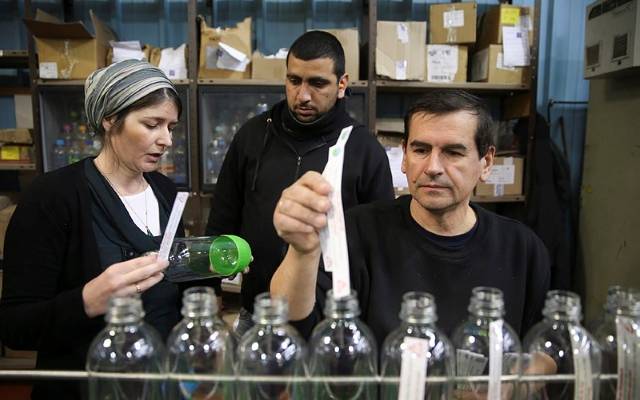The EU is aiming at Israel’s economy with its decision to label Israeli products, but in fact, will mostly cause further damage to the failing Palestinian economy.
The European Union (EU) announced Wednesday it will begin to label Israeli products originating from Judea, Samaria and the Golan Heights in an attempt to generate financial pressure on Israel and, supposedly, in protest of Israel’s policies in these regions.
The EU hopes that Israeli companies will leave industrial parks in Judea and Samaria, thus hindering Israeli financial activity in the area.
An EU official stated in September that they are aware that Palestinians employed by these Israeli companies would lose their jobs as a result of the EU’s moves, but Israelis would lose their jobs as well, and then the incentive to live in Judea and Samaria would diminish.
In fact, the EU official is wrong in his assessment.
The financial risk for Israel’s economy as a result of the European sanction is minimal and the move is mostly declarative. However, the move may be detrimental to the Palestinian economy and may further exacerbate its already inflated unemployment rate.
There are 14 Israeli industrial and agricultural parks in Judea and Samaria, including some 800 factories and businesses employing some 11,000 Palestinian workers alongside 6,000 Israelis. Many thousands more Palestinians earn their livelihoods through secondary services provided to the Israeli factories, such as transportation and the sale of materials.
Whereas Israelis would be able to find jobs elsewhere, Palestinians would be forced to look for work in the failing Palestinian economy, joining a high percentage of the Palestinian population that is unemployed.
“We are just trying to correct what the Israeli government is doing,” the EU official claimed. “It is giving financial incentives to living over the Green Line [in Judea and Samaria], and we are trying to balance that.”
Boycotts on Israel Generate Palestinian Suffering
SodaStream, which produces machines for making carbonated drinks, has been targeted by an international campaign calling for the boycott, divestment and sanctions (BDS) against Israeli companies. Citing financial reasons, SodaStream announced it was closing its factory in Judea and Samaria last year and moving it to the Negev.
“It’s propaganda. It’s politics. It’s hate. It’s anti-Semitism. It’s all the bad stuff we don’t want to be part of,” CEO Daniel Birnbaum said.
SodaStream employed up to 600 Palestinians at its previous factory and sought to transfer their jobs to the plant in the Negev, but, Birnbaum said, Israel has granted only 130 work permits so far due to security issues. Many likely will lose their jobs.
“All the people who wanted to close [SodaStream’s factory in Judea] are mistaken… They didn’t take into consideration the families,” said Ali Jafar, a shift manager from a Palestinian village who has been employed at SodaStream for two years.
The EU’s decision to further boycott Israeli products is likely to generate many such stories.
The Palestinians themselves oppose boycotts on Israel. A recent poll shows that the Palestinians are not interested in boycotts on Israel and their support of such sanctions is constantly declining.
A poll published in September “clearly” shows that there has been a “distinct setback” in the level of support among Palestinians for and “practice of boycott campaigns of Israeli products in general.”
Palestinians Stand to Lose from EU Move
Employment of Palestinians by Israelis is so outstanding that the Palestinian media, which is usually notoriously anti-Israel, lauded Israel for its fair treatment of Palestinian workers.
Palestinian workers in industrial zones in Judea and Samaria are paid twice to three times the average Palestinian salary and receive full social benefits as prescribed by Israeli law. As a result of the EU’s anti-Semitic decision, many thousands of them will be now forced to seek their livelihood in the failing Palestinian economy.
By: Max Gelber, United with Israel
